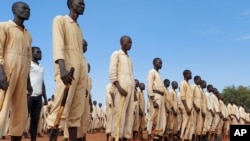U.N. investigators warn that unprecedented levels of ethnically based violence in South Sudan threaten to spiral out of control because of lack of justice and accountability. The report issued Friday will be submitted to the U.N. Human Rights Council, which begins a four-week meeting next week.
The report by the three-member U.N. Commission on Human Rights in South Sudan finds hostilities at the national level have diminished since the signing of the Revitalized Peace Agreement in 2018.
But it says at the local level has escalated to heights never before seen.
The commission says more than 75% of South Sudan currently is engulfed in murderous violence at the local level. Its 47-page report documents what is described as some of the most brutal attacks carried out over the past seven years, mainly in the states of Central Equatoria, Warrap, Jonglei and the Greater Pibor Administrative Area.
Commission Chair Yasmin Sooka says levels of violence in these areas have surpassed those documented in December 2013, when civil war broke out in South Sudan.
“In Jonglei and the Greater Pibor Area, homes have been systematically and deliberately torched, murders and forced displacements have been perpetrated; women and girls have been abducted, they have been raped and gang-raped, sexually enslaved, and in some instances forcibly married off to their captors. Abducted boys have been forced to fight,” she said.
Sooka said the motivation for these localized clashes include competition for power and territory as well as for access to South Sudan’s oil and other rich resources.
“South Sudan is also, in fact, has lots of gold and timber and lots of other really kind of valuable minerals…And the fight for political power and territory goes hand-in-hand with a scramble for resources because access to government gives you access to being able to control all of that,” Sooka said.
The commissioners say gross violations of human rights continue because people know they can get away with their crimes.
They welcome the recent decision by the South Sudanese government to start the process of setting up a domestic-international hybrid court, meant to deliver justice to victims of war crimes and crimes against humanity during the country’s civil war.
But they say more must be done to end the impunity that allows lawlessness in the country to flourish.
Staggering Level of Violence in South Sudan Threatens to Spiral Out of Control, UN Warns
